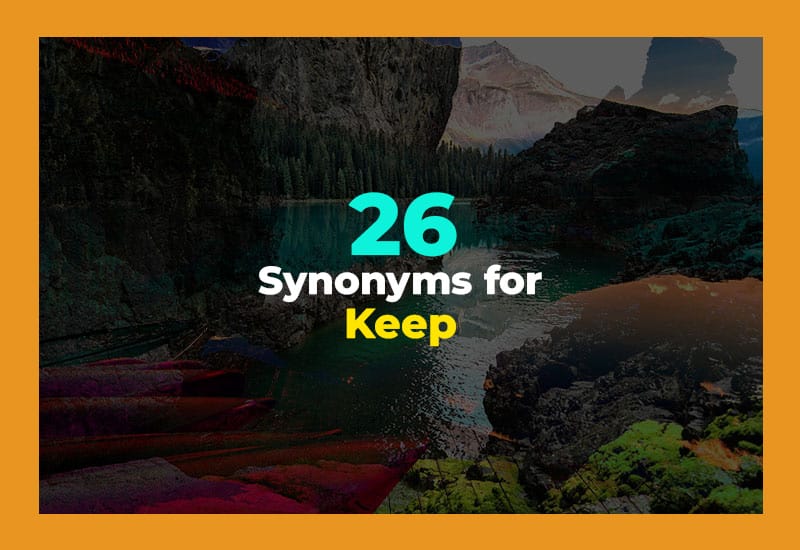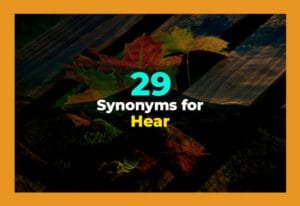You've probably heard the word keep a million times. It's one of those handy words you use every day without even thinking! But what if you want to sound a little more interesting? Or just find a fresh way to say the same thing? Luckily, there are plenty of other words that can mean "keep." Whether you want to hold onto something, save it, or protect it, you'll find some fun alternatives here.
1. Retain
Retain means to hold on to something or not let it go. It's often used in formal or business situations. For example, "The company decided to retain its best employees despite the budget cuts." You can also use it when talking about memories or information, like "Try to retain everything you learn in class." Retain sounds a bit smarter than just "keep," and it suggests you're making an effort to hold onto something important. It works well when you don't want to lose something either physically or mentally.
2. Hold
Hold is a very simple and common word. It means to physically have something in your hands or arms. For example, "Please hold the baby carefully." It can also mean to keep or maintain something, like "Hold your breath for ten seconds." When someone says, "Hold on," they mean to keep waiting or keep going. Hold is great because it's clear and easy to understand in many situations, whether you're talking about objects, feelings, or even positions.
3. Maintain
Maintain means to keep something in good condition or continue something over time. For example, "She maintains a clean and tidy room." It's often used when talking about cars, machines, or habits, like "You should maintain your car regularly." Maintain also means to continue a belief or opinion, such as "He maintains that he was right all along." This word sounds a little formal but is very useful for everyday life and professional talk.
4. Preserve
Preserve means to keep something safe from harm or change. It's often used when talking about nature, history, or food. For example, "We need to preserve the rainforest." Or, "This jar is used to preserve homemade jam." Preserve suggests that you want to keep something exactly as it is, protecting it carefully. It's a great word when you talk about saving special or valuable things that might disappear if not taken care of.
5. Save
Save means to keep something from being lost or wasted. It's a very common word. For example, "I saved my money to buy a new phone." Or, "You should save your work often when using a computer." Save also means to rescue someone, like "The firefighter saved the cat from the tree." This word feels positive and powerful because it's about protecting or keeping something for future use or safety.
6. Store
Store means to keep something in a safe place until you need it. For example, "I store my winter clothes in the attic." It's often used for food, supplies, or information. Like "Make sure to store the files on your computer carefully." Store focuses on putting things somewhere safe or organized. It's practical and useful when you want to talk about saving things for later.
7. Guard
Guard means to keep something safe by watching over it carefully. For example, "The security guard watches the building all night." It can also mean to protect your feelings or secrets, like "She guards her privacy fiercely." Guard is a strong word that suggests defense and protection. When you guard something, you make sure no one can take it or harm it.
8. Protect
Protect means to keep someone or something safe from harm or danger. For example, "Wearing a helmet protects your head." Or, "Parents protect their children from danger." Protect can be physical, like guarding a place, or emotional, like protecting someone's feelings. It's a caring word that shows you are trying to keep something safe and sound.
9. Secure
Secure means to make something safe and certain, often by locking it or controlling it. For example, "Please secure the door before leaving." Or, "He secured a good job after graduation." Secure suggests that you have done something active to keep something safe or certain. It's often used for safety and stability in different situations.
10. Withhold
Withhold means to keep something back or refuse to give it. For example, "The teacher withheld the test results until everyone finished." Or, "He withheld information from the police." It's a more serious word that usually means someone is holding something on purpose, often for a reason. Withhold is good when you want to describe keeping things secret or not sharing something.
11. Carry
Carry means to hold and take something with you. For example, "I always carry my phone in my bag." It can also mean to continue or support something, like "The bridge carries heavy traffic." Carry is a versatile word that's easy to use in many situations. It shows you are moving or keeping something with you physically or metaphorically.
12. Reserve
Reserve means to keep something for future use or a special purpose. For example, "We reserved a table at the restaurant." Or, "She reserved some energy for the last part of the race." Reserve is a polite and formal way to talk about saving or keeping something just in case. It's perfect for plans, spaces, or resources.
13. Cling to
Cling to means to hold on tightly, often because you don't want to let go. For example, "The child clung to her mother's hand." Or, "He clings to his old ideas even though things have changed." This phrase shows strong emotion or determination. It's great for describing physical holding or sticking to beliefs and feelings.
14. Uphold
Uphold means to keep or support a rule, law, or tradition. For example, "The court upheld the decision." Or, "We must uphold honesty in our work." It's a formal word used when talking about values, laws, or standards. Uphold shows respect for what should be kept or maintained over time.
15. Conserve
Conserve means to keep something safe and avoid wasting it, especially natural resources. For example, "We should conserve water during the drought." Or, "The park conserves endangered animals." Conserve is often used in environmental contexts and encourages careful and respectful use of resources. It shows a thoughtful way to keep something for the future.
16. Sustain
Sustain means to keep something going or support it over time. For example, "The company sustained growth for five years." Or, "Good nutrition helps sustain energy." It can also mean to suffer damage, like "The building sustained minor damage." Sustain is a flexible word that fits many situations where continued effort or care is needed.
17. Harbor
Harbor means to keep something hidden or safe, especially feelings or thoughts. For example, "She harbored a secret for years." Or, "The town harbors many historical treasures." Harbor can also mean a safe place for ships. It's a poetic word that shows protection or holding something inside carefully.
18. Detain
Detain means to keep someone from leaving, usually by authority. For example, "The police detained the suspect for questioning." It's often used in legal or official situations. Detain suggests a temporary hold, sometimes against someone's will, for safety or investigation.
19. Lock
Lock means to keep something safe by using a key or device. For example, "Please lock the door before you leave." It's a very clear and physical way to keep something protected. Lock shows security and control, especially for belongings and places.
20. Confine
Confine means to keep something or someone within limits or a certain space. For example, "The dog was confined to the yard." Or, "She confined her comments to the topic." Confine can feel strict or limiting, but it's useful when you want to describe holding things within boundaries.
21. Stick to
Stick to means to keep following a plan, rule, or idea. For example, "You should stick to your diet." Or, "Let's stick to the schedule." This phrase shows determination and consistency. It's casual and common in everyday talk.
22. Follow
Follow means to go after something or obey a rule. For example, "Follow the instructions carefully." Or, "She followed the path through the forest." Follow can mean physically going behind someone or mentally keeping a rule or idea.
23. Continue
Continue means to keep going without stopping. For example, "Please continue reading." Or, "The rain continued all night." It's a simple word that shows something doesn't end. You use continue when you want to describe ongoing actions or states.
24. Save up
Save up means to keep money or resources until you have enough for something. For example, "I saved up to buy a bicycle." It shows patience and planning. Save up is common when talking about finances or collecting things over time.
25. Attend
Attend means to be present at an event or take care of something. For example, "I will attend the meeting tomorrow." Or, "She attends to her garden every day." Attend shows focus and care, whether it's about showing up or looking after something.
26. Tend
Tend means to take care of or look after something regularly. For example, "He tends the chickens on his farm." Or, "Tend to your health by eating well." It's a gentle word that shows attention and care over time.

Final Thoughts
Choosing the right word for “keep” can make your writing and speaking much clearer and more interesting. Each synonym has its own special meaning and fits different situations. Whether you want to hold on to something physically, protect it, or just save it for later, these words help you express that perfectly. Try using some of these synonyms next time you want to sound a bit more creative or precise!









